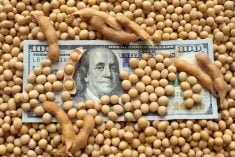Sao Paulo | Reuters – Brazil’s soy processing executives are in talks with Chinese government officials over ways to increase soymeal exports to the Asian nation, industry group Abiove said on Monday.
China already buys around 80 percent of Brazilian soybean exports. According to official data, Brazil exported 55 million tonnes of soybeans to China from January to September, while sales of soymeal – crushed soybeans used for animal feed – were 209,000 tonnes.
In a video message to participants at a biodiesel conference in Sao Paulo, Abiove’s head André Nassar said there was a need to increase exports of meal to help local crushers that are facing rising costs for soybeans.
Read Also

ICE Weekly: No upside for canola if China situation continues: trader
Tony Tryhuk of RBC Dominion Securities said canola should stay rangebound if Canada’s trade war with China continues.
Nassar is part of a Brazilian delegation accompanying agriculture ministry officials visiting China this week to discuss bilateral trade.
While Brazilian soy farmers have benefited from a trade spat between United States and China, which applied a 25-percent additional tax on U.S. soybean imports, Brazilian crushers have seen supplies of soybeans shrink and production costs rise.
“It could be a win-win solution. China could diversify their imports by buying more meal from Brazil, something that in turn would help our crushers,” said Nassar in the message during the Biodieselbr 2018 conference.
Brazilian soymeal exports to China face higher taxes than soybeans. Abiove said it was negotiating with Chinese government officials for a quota to ship meal to China either tax-free or with lower taxes.
In coming years, soy processors are likely to see an uptick in soymeal production as a result of new biodiesel blending guidelines approved last week by the government.
The share of biodiesel in diesel is expected to increase by 1 percentage point every year from 2019 to 2023, from 10 percent currently to 15 percent.
That should increase demand for soyoil – which biodiesel in Brazil is mostly made from – but crushers need to find new markets for the extra soymeal created as a byproduct of the process.
Brazilian soyoil exports could fall next year due to rising local demand for the oil from biodiesel producers and stable crushing capacity, Nassar said.










